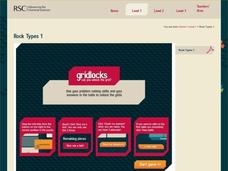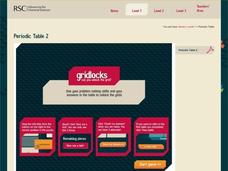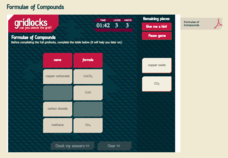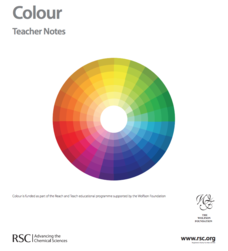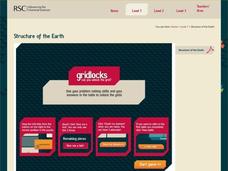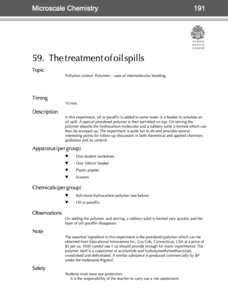Royal Society of Chemistry
Acids
She threw sodium chloride at me—that's a salt! Scholars match acids to their formulas as well as their salt compounds. Completing a series of three gridlock puzzles reinforces each of the matches in a logical manner.
Royal Society of Chemistry
States of Matter 2
While scientists have identified seven states of matter, these puzzles cover the most common three. Scholars match the properties, particle motion, and particle picture to each type of matter. Three Sudoku-style puzzles review the data...
Royal Society of Chemistry
Rock Types 2
All rocks include two or more minerals but greatly vary in appearance. The online interactive encourages scholars to match the rock types to the facts they know about each. They then complete three grid puzzles reviewing the same...
Royal Society of Chemistry
Elements 2
Did you hear about the chemist reading the book about helium? He couldn't put it down. Scholars match 12 chemical elements, including helium, to their symbols. Then they complete three Sudoku-style puzzles using these names and symbols...
Royal Society of Chemistry
States of Matter 1
Do solids, liquids, and gases even matter? Scholars match the state of matter to its particle picture, size and shape description, and description of the arrangement of the particles. Once they complete that activity, they complete a...
Royal Society of Chemistry
Rock Types 1
If pupils think the three types of rock are classic, punk, and hard, these puzzles offer gentle correction. Scholars match the type of rock to how it formed and an example in four grid puzzles. Each requires problem-solving and...
Royal Society of Chemistry
Periodic Table 2
While the periodic table looks complex, it is really arranged by only two variables, atomic number and electron configuration. The set of four puzzles focuses on groups 3, 4, 5, and 6 or 13, 14, 15, and 16, depending on your periodic...
Royal Society of Chemistry
Periodic Table 1
Richard Feynman predicted the periodic table might go up to number 137—but never to 138. Scholars practice naming which elements belong in groups 1, 2, 7, and 0 on the periodic table in puzzles. They work through four puzzles reinforcing...
Royal Society of Chemistry
Naming Binary Compounds
Penguinone is an organic compound named because it resembles a penguin. Scholars match the name of binary compounds to the elements in each compound. Then, they solve three sets of puzzles reviewing the same content.
Royal Society of Chemistry
Formulae of Compounds
Many people confuse the chemical formulas for copper carbonate and copper oxide. A set of challenging puzzles review commonly confused compound names and their symbols. Through a series of four puzzles, pupils match the names and...
Royal Society of Chemistry
Everyday Chemicals (Ages 11-14)
Caustic soda helps break up clogs in drains in many homes. Scholars match 10 chemical names to their everyday names; for example, caustic soda is sodium hydroxide. Then, they complete three different grid puzzles practicing this skill.
Royal Society of Chemistry
Elements 3
Many pupils mix up the chemical symbols for calcium, carbon, and copper. These entertaining puzzles help scholars remember the names and symbols. First, they match the name and symbol of 12 elements. Then, through a series of three...
Royal Society of Chemistry
Colour—Gifted and Talented Chemistry
Add a splash of color to your chemistry class! Science scholars discover the principles behind color through a wide variety of hands-on activities. Lessons include dyes, chromatography, and flame tests.
Royal Society of Chemistry
Testing for Gases
If most gases are invisible, how do we know so much about them? Pupils practice associating the name, formula, testing method, and outcome for four common gases using an interactive. Users build on the content of their first puzzles to...
Royal Society of Chemistry
Structure of the Earth
What lies beyond the ground beneath our feet? Young geologists learn the four main layers of Earth with an engaging puzzle set. The interactive illustrates each layer, and users must place them correctly before they can progress to the...
Royal Society of Chemistry
Elements 1
The periodic table can be a little overwhelming to young scientists. Meet your class' worries head on by introducing the table in a game. Individuals test their knowledge of the names and symbols of common elements, then use deductive...
Royal Society of Chemistry
Compounds Ending in 'ate'
Tackle polyatomic ions with Sudoku-like games! Nomenclature novices practice identifying the names and constituents of carbonate compounds with a series of puzzles. Scholars can use the resource online or as a worksheet, thanks to the...
Royal Society of Chemistry
A Solid-Solid Reaction between Lead Nitrate and Potassium Iodide
Why is it so difficult to make two solid compounds react? Investigate the concepts of particle collisions and rate of reaction using a quick demonstration. The colorful experiment features two plain, white solids combining to form a...
Royal Society of Chemistry
A Reversible Reaction of Hydrated Copper (II) Sulfate
How can removing water change the color of a substance? Lab partners remove the water of crystallization from hydrated copper (II) sulfate, record their observations, then rehydrate the solid. The resource is printable and contains ideas...
Royal Society of Chemistry
A Giant Silver Mirror Experiment
Mirror, mirror, on the wall ... who's the best chemistry teacher of them all? You'll get the vote for certain after your class completes the Silver Mirror experiment! Partnered pupils use Tollen's reagent and glucose to silverplate a...
Royal Society of Chemistry
A Cartesian Diver—Classic Chemistry Experiments
Sometimes the simplest experiments leave the biggest impression! Introduce young chemists to the Cartesian Diver by having them make one of their own. Use the Diver to further their study of liquids and gases, as well as compression.
Royal Society of Chemistry
The Treatment of Oil Spills—Microscale Chemistry
When oil spills happen, how is the oil cleaned up? Pupils of polymer science discover an amazing substance that turns oil into a solid during a microscale experiment. Individuals observe oil or paraffin before and after addition of the...
Royal Society of Chemistry
Some Reactions of Carbon Dioxide—Microscale Chemistry
Precipitation reactions are always interesting. How about one that forms a precipitate using a gas? Chemists of any age will enjoy this twist on a standard solubility lab. Partners observe the lack of interaction between sodium hydroxide...
Royal Society of Chemistry
Mass Changes in Chemical Reactions—Microscale Chemistry
What better way is there to introduce conservation of mass than a few simple experiments? Young chemists conduct two chemical reactions, take the masses of reactants and products, then compare their results to determine differences in...







